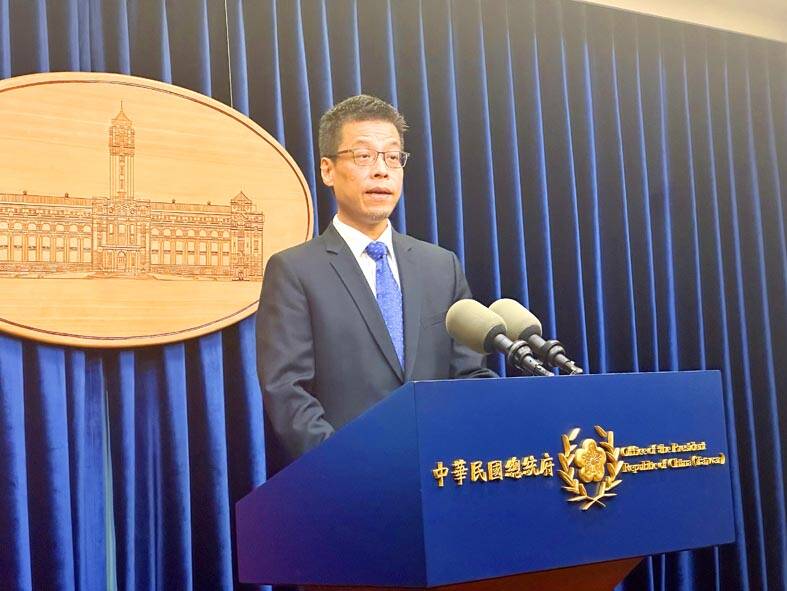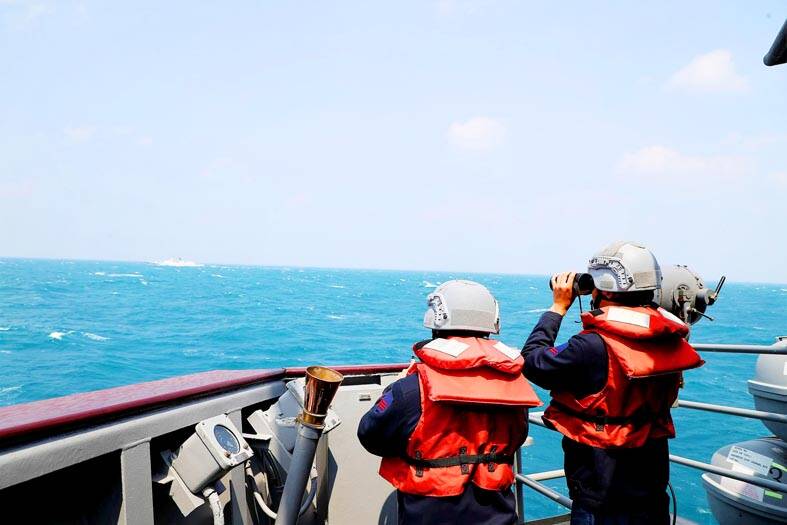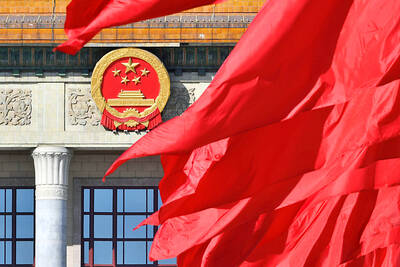It is sad that military personnel would allegedly sell out Taiwan, the Ministry of National Defense (MND) said yesterday after the High Prosecutors’ Office on Monday questioned a lieutenant colonel and others over accusations that they leaked national defense secrets to Chinese Communist Party (CCP) spies.
Officers searched the 601st Aviation Brigade’s base in Taoyuan and questioned a lieutenant colonel surnamed Hsieh (謝) and his alleged handler, also surnamed Hsieh.
Four others, three civilians and a retired major, were also questioned.

Photo: Chen Yun, Taipei Times
The major posted bail of NT$60,000, two civilians posted bail of NT$20,000 each and the other civilian posted bail of NT$50,000.
The Taoyuan District Prosecutors’ Office received a tip-off saying that the lieutenant colonel and others were leaking national defense secrets.
The High Court on Monday approved a request by the High Prosecutors’ Office to detain the two Hsiehs on charges of colluding with a foreign aggressor.

Photo courtesy of the Ministry of National Defense
The Ministry of Justice said that the arrests were conducted in a joint operation conducted by the ministry and national security agencies.
The ministry would continue counterintelligence efforts within the military and keep protecting classified projects, it said.
Presidential Office Deputy Secretary-General Alex Huang (黃重諺) said that the alleged actions were “shameful.”
The case should be investigated thoroughly and there should be severe sentences for anyone found guilty, Huang said.
Treason by active-duty military personnel by passing confidential information to China carries a maximum 10-year sentence.
Taiwanese trust the military to guard the nation, so acts betraying that trust should be met with the most severe recriminations, he said.
The government and national security agencies would maintain their defense of information security to prevent such incidents, he said.
Separately, Chen Tsung-yuan (陳宗元), a lawyer, said that previous cases of retired military personnel contravening the National Security Act (國家安全法) involved district prosecutors’ offices, but this case was being handled by the High Prosecutors’ Office, which usually oversees cases involving rebellion, sedition and collusion with foreign state aggressors.
The case shows that the CCP’s methods to lure Taiwanese personnel have improved markedly, Chen said.
If it is proven that active military personnel have leaked classified defense documents to the enemy, it would be a great blow to national security, he said.
Additional reporting by Chien Li-chung

US PUBLICATION: The results indicated a change in attitude after a 2023 survey showed 55 percent supported full-scale war to achieve unification, the report said More than half of Chinese were against the use of force to unify with Taiwan under any circumstances, a survey conducted by the Atlanta, Georgia-based Carter Center and Emory University found. The survey results, which were released on Wednesday in a report titled “Sovereignty, Security, & US-China Relations: Chinese Public Opinion,” showed that 55.1 percent of respondents agreed or somewhat agreed that “the Taiwan problem should not be resolved using force under any circumstances,” while 24.5 percent “strongly” or “somewhat” disagreed with the statement. The results indicated a change in attitude after a survey published in “Assessing Public Support for (Non)Peaceful Unification

The CIA has a message for Chinese government officials worried about their place in Chinese President Xi Jinping’s (習近平) government: Come work with us. The agency released two Mandarin-language videos on social media on Thursday inviting disgruntled officials to contact the CIA. The recruitment videos posted on YouTube and X racked up more than 5 million views combined in their first day. The outreach comes as CIA Director John Ratcliffe has vowed to boost the agency’s use of intelligence from human sources and its focus on China, which has recently targeted US officials with its own espionage operations. The videos are “aimed at

‘MISGUIDED EDICT’: Two US representatives warned that Somalia’s passport move could result in severe retaliatory consequences and urged it to reverse its decision Minister of Foreign Affairs Lin Chia-lung (林佳龍) has ordered that a special project be launched to counter China’s “legal warfare” distorting UN Resolution 2758, a foreign affairs official said yesterday. Somalia’s Civil Aviation Authority on Wednesday cited UN Resolution 2758 and Mogadishu’s compliance with the “one China” principle as it banned people from entering or transiting in the African nation using Taiwanese passports or other Taiwanese travel documents. The International Air Transport Association’s system shows that Taiwanese passport holders cannot enter Somalia or transit there. The Ministry of Foreign Affairs (MOFA) protested the move and warned Taiwanese against traveling to Somalia or Somaliland

SECURITY: Grassroots civil servants would only need to disclose their travel, while those who have access to classified information would be subject to stricter regulations The government is considering requiring legislators and elected officials to obtain prior approval before traveling to China to prevent Chinese infiltration, an official familiar with national security said yesterday. President William Lai (賴清德) in March announced 17 measures to counter China’s growing infiltration efforts, including requiring all civil servants to make trips to China more transparent so they can be held publicly accountable. The official said that the government is considering amending the Act Governing Relations Between the People of the Taiwan Area and Mainland Area (臺灣地區與大陸地區人民關係條例) to require all civil servants to follow strict regulations before traveling to China.